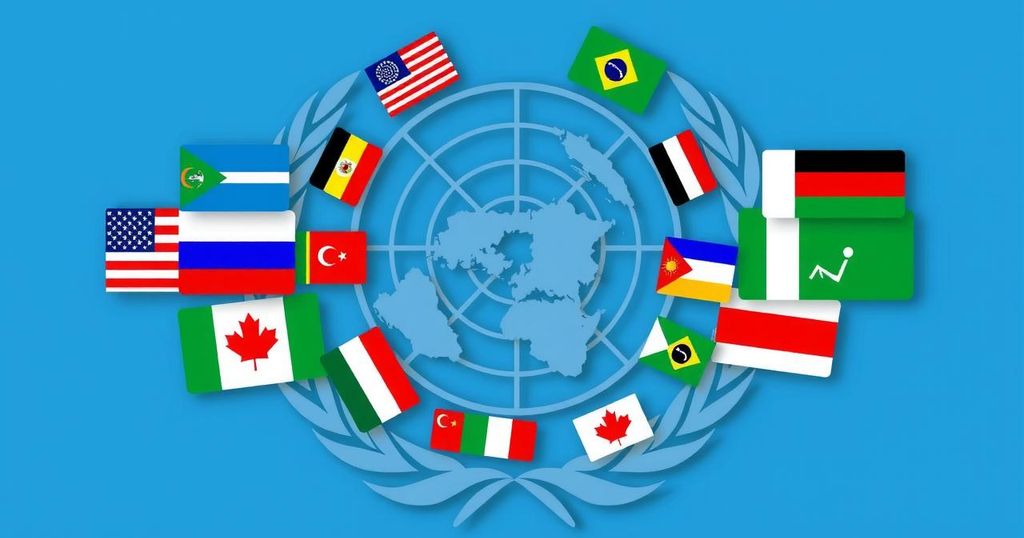Global news
AFRICA, ASIA, CONFLICT RESOLUTION, DIPLOMACY, EUROPE, GAZA, GAZA STRIP, GENERAL ASSEMBLY, INTERNATIONAL RELATIONS, KASHMIR, NORTH AMERICA, PAKISTAN MISSION, PHIL, PHILEMON YANG, POLAND, SAI, SAIMA SALEEM, SALEEM, SAN FRANCISCO, SECURITY COUNCIL, SOVEREIGNTY, SUDAN, TWO-STATE SOLUTION, UN GENERAL ASSEMBLY, UNITED STATES
Isaac Bennett
0 Comments
Pakistan Affirms Commitment to Multilateralism at UN General Assembly
- Pakistan underscores its unwavering belief in multilateralism during the UN General Assembly.
- The 80th anniversary of the UN Charter highlights the need for a renewed commitment to its principles.
- Saima Saleem calls for collective action on longstanding issues like Kashmir and Palestine.
- General Assembly President emphasizes diplomacy over force amid ongoing global conflicts.
- The UN has expanded from 50 to 193 member nations since its founding in 1945.
Pakistan’s Commitment to Multilateralism Stressed at UN
Pakistan has reiterated its unwavering commitment to multilateralism, preventive diplomacy, and peaceful conflict resolution in a recent statement made during the United Nations General Assembly’s 80th anniversary of the signing of the UN Charter. The Pakistani delegate, Saima Saleem, emphasized the Charter’s significance as a “pillar of international peace, justice, and cooperation.” This anniversary, she urged, should serve not only as a moment of remembrance but also as a call to action, a collective pledge aimed squarely at restoring trust in multilateral efforts while revitalizing the foundational ideals of the United Nations.
Marking Eight Decades Since the Charter’s Signing
The original signing of the UN Charter was a momentous occasion, occurring on June 26, 1945, when representatives from 50 nations came together in San Francisco, California. Since its inception, the UN membership has expanded remarkably, now serving 193 countries worldwide. During this significant commemoration, General Assembly President Philemon Yang termed the event “symbolic” but acknowledged its somber nature, given the current global crises including those in Gaza, Ukraine, and Sudan. Amidst these conflicts, Yang stressed the urgency of choosing diplomacy over force, insisting on the need to uphold the Charter’s vision for peace and human dignity.
Relevance of Charter Principles in Today’s World
Saleem went on to highlight that over the past 80 years, the UN has acted as a beacon of hope for countless nations. The principles outlined in the Charter—such as the sovereign equality of states and the right to self-determination—remain just as vital today as they were back in 1945 when the Organization kicked off its mission. She pointed out the pressing need for renewed commitment to these ideals in the face of complex global issues, such as ongoing conflicts and climate change. On matters of longstanding disputes like those in Jammu and Kashmir and Palestine, Saleem stated that the failure to implement Security Council resolutions is an impediment to the achievement of self-determination and justice for affected communities.
In summary, Pakistan’s reaffirmation of its commitment to multilateralism during the UN General Assembly emphasizes the importance of collective action in addressing global challenges. The commemoration of the UN Charter’s 80th anniversary serves as a reminder of the principles that formed the foundation of the United Nations and the need for renewed dedication to these ideals. With ongoing conflicts and humanitarian crises around the world, the call for diplomacy and a commitment to self-determination remains more crucial than ever.




Post Comment